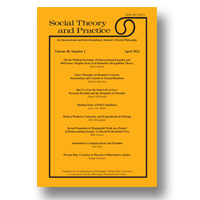|
|
|
1.
|
Social Theory and Practice:
Volume >
50 >
Issue: 1
Marcus Arvan
Educational Justice and School Boosting
abstract |
view |
rights & permissions
| cited by
School boosters are tax-exempt organizations that engage in fundraising efforts to provide public schools with supplementary resources. This paper argues that prevailing forms of school boosting are defeasibly unjust. Section 1 shows that inequalities in public education funding in the United States violate John Rawls’s two principles of domestic justice. Section 2 argues that prevailing forms of school boosting exacerbate and plausibly perpetuate these injustices. Section 3 then contends that boosting thereby defeasibly violates Rawlsian principles of nonideal theory for rectifying injustice. Thus, boosting should be presumptively either made illegal or substantially reformed. Finally, Section 4 responds to potential objections.
|
|
|
|
|
|
|
2.
|
Social Theory and Practice:
Volume >
50 >
Issue: 1
Elizabeth Bell
Against Moral Individualism:
Special Relations and the Agent-Neutral/Agent-Relative Distinction
abstract |
view |
rights & permissions
| cited by
A central tenet of moral individualism is that only an entity’s intrinsic (non-relational) properties can ground moral status because only intrinsic properties give rise to agent-neutral reasons. However, I show that the two main approaches to making the agent-neutral/agent-relative distinction fail to exclude morally salient relational (extrinsic) properties from giving rise to agent-neutral reasons. As such, moral individualism accounts of moral status are false. Further, arguments that depend on moral individualism’s central tenet—like the argument from “marginal” cases—are unable to defend their thesis by merely claiming that special relations cannot ground moral status.
|
|
|
|
|
|
|
3.
|
Social Theory and Practice:
Volume >
50 >
Issue: 1
Lisa Herzog
Bodies at Work:
The Normative Dimensions of the Geography of Work
abstract |
view |
rights & permissions
| cited by
“Home office” has become a reality for many employees. What is normatively at stake in this shift in the geography of work, given the various forms of structural injustice in our societies? Drawing on the normative criteria of employee well-being and protection from harm, autonomy, non-discrimination, environmental impact, and the role of workplaces as spaces of social encounters, I defend two claims: First, decisions about where individuals work need to be proceduralized on a fair basis, giving employees a voice. Second, giving up the workplace requires a broader discussion about alternatives spaces for social integration.
|
|
|
|
|
|
|
4.
|
Social Theory and Practice:
Volume >
50 >
Issue: 1
Jakob Huber
Reconciliation or Anticipation?:
Reasonable Hope beyond Rawls
abstract |
view |
rights & permissions
| cited by
What may democratic citizens hope for? In order to answer this question, this article takes its cue from John Rawls’s notion of reasonable hope. Rawls is acutely aware of a tension we face in demarcating the limits of hope in democratic politics, yet fails to resolve it: hope should allow us to critically distance ourselves from the existing social world, yet not be entirely disconnected from it. In order to do justice to both desiderata, I propose to distinguish between individual and collective levels of reasonable hope, with democratic institutions and practices mediating between the two.
|
|
|
|
|
|
|
5.
|
Social Theory and Practice:
Volume >
50 >
Issue: 1
Elizabeth C. Hupfer
Inefficient Charity
abstract |
view |
rights & permissions
| cited by
Theories such as effective altruism contend that people are morally obligated to give to charitable organizations that will efficiently do the most net good. The assumption is that aiding people who are most in need will create the most good; yet, it may be more inefficient to reach those most in need. In response, I outline my Inefficiency Principle in which efficiency has less moral weight when aiding those lacking in basic capabilities, and efficiency has more moral weight when aiding those who are lacking in more complex capabilities. This principle acknowledges the obstacles in assisting those most in need while sustaining the moral importance of efficiency.
|
|
|
|
|
|
|
6.
|
Social Theory and Practice:
Volume >
50 >
Issue: 1
Johannes Steizinger, Natalie Alana Ashton
Feminist Standpoint Theory vs. the Identitarian Ideology of the New Right:
A Critical Comparison
abstract |
view |
rights & permissions
| cited by
The term ‘identity politics’ is used to refer to a wide range of political movements. In this paper, we look at the theoretical ideas underpinning two strongly, mutually opposed forms of identity politics, and identify some crucial differences between them. We critically compare the identitarian ideology of the New Right with feminist standpoint theory, focusing on two issues: relativism and essentialism. In carrying out this critical comparison we illuminate under-theorized aspects of both new right identitarianism and standpoint theory; demonstrate how the two are distinct; reveal the depth and pervasiveness of the new right ideology’s flaws; and show what a coherent left-wing identity politics could look like.
|
|
|
|
|
|
|
7.
|
Social Theory and Practice:
Volume >
50 >
Issue: 1
Denise Vigani
Habituation into Virtue and the Alleged Paradox of Moral Education
abstract |
view |
rights & permissions
| cited by
Some philosophers have argued that Aristotle’s view of habituation gives rise to a ‘paradox of moral education.’ The inculcation of habit, they contend, seems antithetical to the cultivation of virtue. I argue that this alleged paradox arises from significant misunderstandings of Aristotle’s view. Habit formation need not be at odds with the development of the kinds of intelligent, reflective capacities required for virtue. Indeed, Aristotle seems right to insist on an important role for habit in the cultivation of virtue. I suggest that habit formation is part of the story of how the virtuous come to see the world aright.
|
|
|
|
